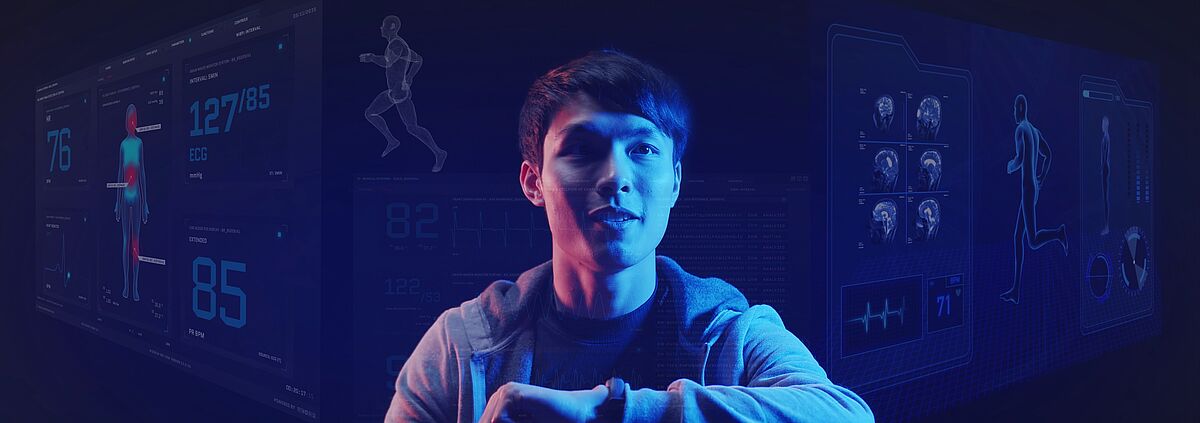Smart Work-Life Assistants
The goal of our research is to create systems for guiding work-related health-management. Such systems address the increasing interest in and demand for healthier work and life habits in the modern working world. For example, long hours of un-interrupted computer-based work leads to excessive sedentary behaviour that is highly detrimental and can cause manifold health complaints in the long run. However, despite of the overwhelming amount of health-related literature, individuals still have knowledge deficits and/or struggle to implement behaviour changes.
The key idea is hence to empower individuals with assistance systems that provide guidance, interventions or “nudges” for healthy lifestyle changes in conjunction with feedback and essential knowledge. In our research, we emphasize personalization and context-sensitivity for systems that are both effective and easy to integrate in everyday life.
Research Topics
- Theory and content of personalized adaptive just-in-time interventions
- Design and implementation of sensor-enabled, context-sensitive systems
- Maximizing persuasiveness of recommendations (e.g., using generative AI)
- Empirically grounded design principles for adaptive recommender systems
Systems
Please note: Once you watch the video, data will be transmitted to Youtube/Google. For more information, see Google Privacy.
Activities
| Duration | Type | Topic |
| Since 2023 | Cooperation | Evaluation of exergames in an interdisciplinary team with professors from the universities of Linköping (Sweden), Groningen (Netherlands) and Twente (Netherlands). Exergames are playful fitness exercises for everyday work. |
| Since 2022 | PhD | Angelina Clara Schmidt: Assistance Systems for Healthy and Productive Computer-based Work / Engineering "New Work" Support Systems: Assistance systems for productivity and health in the modern working world. |
| Since 2021 | PhD | Dimitri Kraft: Conception and evaluation of a web-cam-based system for health prevention during computer work. |
| Since 2021 | Prototype development | Collaboration on the further development of Fraunhofer IGD's CareCam in the field of interventions and gymnastics feedback |
| Since 2020 | Cooperation | Cooperation and exchange with Fraunhofer IGD Rostock on the topic of sensor technology and self-tracking in the office work context. |
| Since 2018 | Prototype development | Wearable Lifestyle Recommender - development of a smartwatch-based recommender system for personalised and context-sensitive micro-coaching with scientifically sound recommendations. |
Selected publications
- Schmidt, A.; Shahid, H.; Kraft, D.; Bieber, G.; Fellmann, M. (2023): Interactive Exercises for Computer-based Work Using a Webcam. In: Proceedings of the 8th international Workshop on Sensor-Based Activity Recognition and Artificial Intelligence (iWOAR '23). Association for Computing Machinery, New York, NY, USA, Article 6, 1–8.
- Bissinger, B.; Beer, A.; Märtin, C.; Fellmann, M. (2023): Emotion Recognition via Facial Expres-sions to Improve Virtual Communication in Videoconferences. In: Kurosu, M.; Hashizume, A. (Eds.): Human-Computer Interaction. Thematic Area, HCI 2023, Held as Part of the 25th HCI International Conference, HCII 2023, Copenhagen, Denmark, July 23–28. Proceedings, Part II, 1st ed. 2023. Cham : Springer (LNCS 14012), pp. 151–163
- Kraft, D.; Schmidt A.; Büttner, L.; Oschinsky, F. M.; Lambusch, F.; Van Laerhoven, K.; Bieber, G.; Fellmann, M. (2022): CareCam: Towards user-tailored Interventions at the Workplace using a Webcam. In: Proceedings the 15th International Conference on Pervasive Technologies Related to Assistive Environments (PETRA '22). June 2022, ACM, pp. 494–499. [Best Paper Award of the conference]
- Schmidt, A.; Kraft, D.; Lambusch, F.; Fellmann, M. (2023): User-Perception of a Webcam-Based Intervention System for Healthy Habits at Computer Workstations. In: Cabitza, F.; Fred, Ana L. N.; Gamboa, H.: Proceedings of the 16th International Joint Conference on Biomedical Engineering Systems and Technologies, BIOSTEC 2023, Volume 5: HEALTHINF, Lisbon, Portugal, February 16-18, 2023. SCITEPRESS 2023, pp. 567-580.
- Dhiman, H.; Nemoto, Y.; Fellmann, M.; Röcker, C. (2023): Beyond productivity and efficiency: design tools, methods and frameworks for psychological well-being, and(un)exploited potentials to assist employees at work. Frontiers in Computer Science 5:1129087. DOI: 10.3389/fcomp. 2023.1129087
- Richter, H.; Fellmann, M.; Lambusch, F.; Kranzusch, M. (2022): Towards an Architectural Concept for a Wearable Recommendation System to Support Workplace Productivity and Well-Being. In: Kurosu, M. (ed.): Human-Computer Interaction. User Experience and Behavior: Thematic Area, HCI 2022, Held As Part of the 24th HCI International Conference, HCII 2022, Virtual Event, June 26 – July 1, 2022, Proceedings, Part III, Bd. 13304. Cham: Springer (Lecture Notes in Computer Science), S. 416–429
- Bissinger, B., Märtin, C., Fellmann, M. (2022). Support of Virtual Human Interactions Based on Facial Emotion Recognition Software. In: Kurosu, M. (Eds.) Human-Computer Interaction. Techno-logical Innovation. HCII 2022. Cham : Springer (LNCS 13303), pp. 329-339.
- Bissinger, B.; Fellmann, M.; Märtin, C; Hohmann, D. (2022): Emotionserkennungssoftware auf Basis von Gesichtsausdrücken als Möglichkeit zur Unterstützung der virtuellen Zusammenarbeit. In: Fazal-Baqaie, M.; Linssen, O.; Volland, A.; Yigitbas, E.; Engstler, M.; Bertram, M.; Kalenborn, A. (Eds.) Projektmanagement und Vorgehensmodelle 2022 - Virtuelle Zusammenarbeit und verlorene Kulturen? Bonn : Gesellschaft für Informatik e.V., pp. 195–202
- Dhiman, H.; Fellmann, M.; Röcker, C. (2022): Towards AI-Enabled Assistant Design Through Grassroots Modeling: Insights from a Practical Use Case in the Industrial Sector. In: Nazaruka, E.; Sandkuhl, K.; Seigerroth, U. (Eds.) Perspectives in Business Informatics Research. BIR 2022. Cham : Springer (LNBIP 462), pp. 96–110.
- Dhiman, H.; Nemoto, Y.; Muehlan, H.; Fellmann, M.; Röcker, C. (2022): Towards designing assistants for well-being: clarifying the relationship between users' intrinsic motivation and expecta-tions from assistants. In: Proceedings of the International Conference on Information Systems (ICIS 2022), Paper10.
- Nemoto, Y.; Fellmann, M.; Röcker, C.; Dhiman, H. (2022): Beyond Efficiency and Productivity: Why and How Worker Assistants should Support Beyond Efficiency and Productivity. In: Procee-dings of the 2022 International Conference on Advanced Visual Interfaces AVI '22, June 7, 2022, Rome, Italy, ACM. 6 Pages.
- Dhiman, H.; Wächter, C.; Fellmann, M.; Röcker, C. (2022): Intelligent Assistants: Conceptual Dimensions, Contextual Model, and Design Trends. Business & Information Systems Engineering 64(4), pp. 645-665.
- Cap, C. H.; Fellmann, M.; Põder, J.-H. (2021): Muster für Ein Ethisches Design Von Assistenzsystemen. Conexus - Publikation der fortgeschrittenen Forschenden und Lehrenden der Universität Zürich, 4:131-54
- Dehkordi, F.N.; Fellmann M.; Breitschwerdt, R. (2019): Comparison of Different Requirements for Digital Workplace Health Promotion. In: Pankowska M., Sandkuhl K. (Eds.) Perspectives in Busi-ness Informatics Research (BIR 2019). Cham : Springer (LNBIP 365), pp 16–29.
- Lambusch, F.; Fellmann, M.; (2018): Towards Context-Aware Assistance for Smart Self-Management of Knowledge Workers. In: Zdravkovic, J.; Grabis, J.; Nurcan, S.; Stirna, J. (Eds.) Joint Proceedings of the BIR 2018 Short Papers, Workshops and Doctoral Consortium, co-located with 17th International Conference Per-spectives in Business Informatics Research (BIR 2018), Stockholm, Sweden, September 24–6, 2018. CEUR-WS.org (vol-2218), 12 Pages




